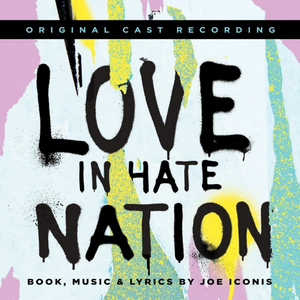BWW Album Review: LOVE IN HATE NATION Is Defiant But Familiar
Joe Iconis's latest musical gets its cast album.

The teen musical space has had no shortage of successful entries in the recent canon. That's the company that Joe Iconis's latest musical, Love in Hate Nation, is hoping to join. With some catchy tunes and a talented cast, the cast recording of the new show is a valiant effort, but it never quite rises to standout status.
More than anything, Love in Hate Nation wants to raise a rebel voice. Set in the 1960s, it centers on Susannah Son (a wonderful Amina Faye). Susannah is a queer, Black teenage girl dealing with depression in an era that understood even less about mental health than we do today. After a suicide attempt, her father sends her to an all-girls reformatory, filled with "tough" girls and cruel adults. Her introduction, "Susannah's Song," sets the tone for the character and lays out the story as we know it, and her vocals on the Act 1 finale, "I Hope," give the music the oomph it needs to keep you invested across intermission.
If you think this sounds like awfully dark material for a pop-rock teen musical, you'd be right. It seems to be aiming for something along the darkly satirical lines as Heathers or Chicago (or, for on-screen comparisons, Orange Is the New Black or The Breakfast Club), but it doesn't quite get there. In short order, with a classic "meet the gang" song "Life in Hate Nation," we're introduced to Susannah's new schoolmates, each of whom has their own reason for being sent there. There's an odd tonal contrast here: in some ways, it does feel like the pitch-black comedy of Chicago's "He Had It Coming," but then that humor comes up against the reminder that these are troubled kids failed by everyone, not "merry murderesses." It's too poppy and energetic to be serious, too dark to be humorous, so what is it?
At least a little bit of the answer comes with "The Three Failed Escape Attempts of Sheila Neil," a clever song introducing Kelly McIntyre's pyromaniac bad girl. The growing feelings between Sheila and Susannah provide a heart for a story that very much needs one. Their two duets, "The Other One" and "Oh Well," are two of the best songs in the whole album, offering more focused character moments. Faye and McIntyre are certainly standouts among the cast, although every single person is doing their mightiest to imbue each track with energy.
Part of the reason those two songs stand out, it feels, is that they are particular to the characters and heartfelt. In borrowing from '60s girl-group and rebel-rock sounds, in addition to his usual, Top-40-meets-Broadway style, Iconis leans into musical idioms that are sure to stick in audience members' memories, but don't always do the job of conveying depth of plot and character. It takes a while to get there, but "Revolution Song," near the end of the story, finally unleashes the kind of electricity we've been waiting for. It's exactly the kind of eleven-o'-clock number that fulfills the hints of what has come before. Is it too late, though, to have the emotional impact we're hoping for? Audiences will have to decide for themselves.
An Iconis score is almost always about the quirky, rebellious outcasts of the world, and that's great musical fodder. But not every rebel is the same, and being "different" encompasses a huge range of specific experiences. That's where Love in Hate Nation stumbles. It leans heavily on the tropes we expect from stories about "troubled" teens, without really exploring them beyond the expected "look how oppressive society was!" message. There's a difference between the generic "quirky outcast" as a trope and a deeper exploration of the unique situation of a character, and this score leans more towards the former, where the latter would have arguably been more absorbing.
Don't get me wrong - it's a singable, hummable score that is sure to win plenty of fans. As a piece of storytelling, it never quite finds its groove, but there's still plenty to enjoy.
Add Your Comment
Videos
